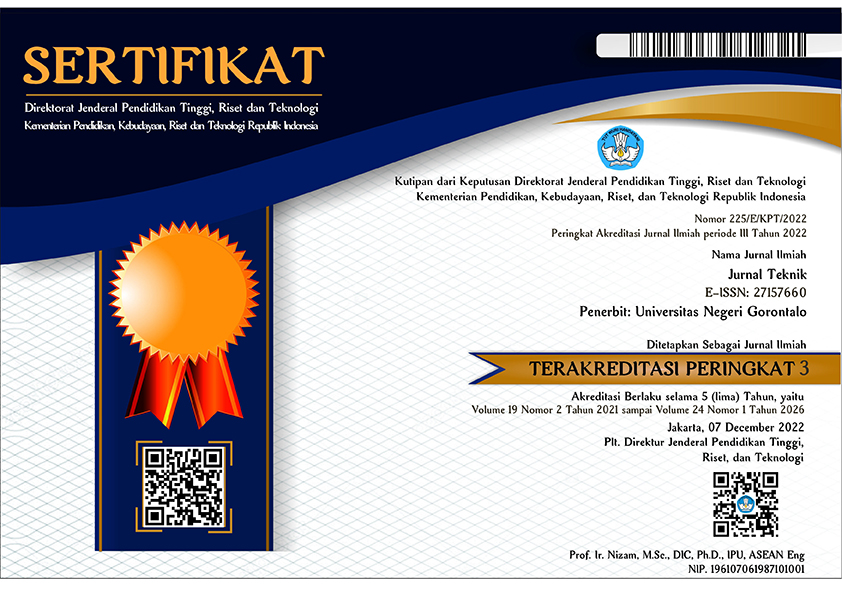Enhancing Compressive Strength of Self-Compacting Concrete (SCC) through Rice Husk Ash and Superplasticizer Incorporation
Abstract
The increasing demand for sustainable construction materials has encouraged the utilization of alternative materials, such as rice husk ash (RHA), and the use of chemical admixtures like superplasticizers in self-compacting concrete (SCC). This study aims to evaluate the effects of RHA and superplasticizer incorporation on the fresh and hardened properties of SCC, focusing on flowability, segregation resistance, and compressive strength. The experimental program involved three SCC mixtures: normal concrete, and SCC with 4% and 8% RHA and superplasticizer by cement weight. Fresh concrete properties were assessed using the slump flow, V-Funnel, and L-Box tests, while compressive strength tests were conducted on cube specimens after 28 days of curing. The results indicated that the addition of 4% RHA and superplasticizer enhanced the compressive strength to 34.02 MPa and maintained flowability within the specified limits, with an average slump flow diameter of 675–697 mm, V-Funnel time of 7.35–8.72 seconds, and L-Box ratio of 0.84–0.85. However, the 8% RHA mixture exhibited a decline in compressive strength (28.51 MPa), highlighting the detrimental effects of excessive superplasticizers on particle cohesion. Furthermore, the use of RHA reduced concrete density, showcasing its potential for lightweight construction applications. These findings confirm that a 4% RHA and superplasticizer dosage optimizes SCC performance, supporting sustainable construction through resource-efficient and durable materials. The study underscores the need for precise mix designs and suggests broader applications of RHA and chemical admixtures in advancing green concrete technologies.
Downloads
References
Ahmadi, M. A., Alidoust, O., Sadrinejad, I., Nayeri, M., Cement, A., & Ash, B. R. H. (2007). Development of Mechanical Properties of Self Compacting Concrete Contain Rice Husk Ash. World Academy of Science, Engineering and Technology, 1(34), 168–171.
Antiohos, S. K., Papadakis, V. G., & Tsimas, S. (2014). Rice husk ash (RHA) effectiveness in cement and concrete as a function of reactive silica and fineness. Cement and Concrete Research, 61–62, 20–27. https://doi.org/https://doi.org/10.1016/j.cemconres.2014.04.001
Aziz, A., Mehboob, S. S., Tayyab, A., Khan, D., Hayyat, K., Ali, A., & .Qureshi, Q. B. I. L. (2024). Enhancing sustainability in self-compacting concrete by optimizing blended supplementary cementitious materials. Scientific Reports, 14(1), 1–23. https://doi.org/10.1038/s41598-024-62499-w
Ben Aicha, M. (2020). 8 - The superplasticizer effect on the rheological and mechanical properties of self-compacting concrete (P. Samui, D. Kim, N. R. Iyer, & S. B. T.-N. M. in C. E. Chaudhary (eds.); pp. 315–331). Butterworth-Heinemann. https://doi.org/https://doi.org/10.1016/B978-0-12-818961-0.00008-9
Chen, C. H., Huang, R., Wu, J. K., & Yang, C. C. (2006). Waste E-glass particles used in cementitious mixtures. Cement and Concrete Research, 36(3), 449–456. https://doi.org/10.1016/j.cemconres.2005.12.010
Chiu, C. H., Wen, T. H., Chien, L. C., & Yu, H. L. (2014). A probabilistic spatial dengue fever risk assessment by a threshold-based-quantile regression method. PLoS ONE, 9(10), 1–13. https://doi.org/10.1371/journal.pone.0106334
Chopra, D., Siddique, R., & Kunal. (2015). Strength, permeability and microstructure of self-compacting concrete containing rice husk ash. Biosystems Engineering, 130, 72–80. https://doi.org/https://doi.org/10.1016/j.biosystemseng.2014.12.005
Das, S. K., Adediran, A., Kaze, C. R., Mustakim, S., M., & Leklou, N. (2022). Production, characteristics, and utilization of rice husk ash in alkali activated materials: An overview of fresh and hardened state properties. Construction and Building Materials, 345(July), 128341. https://doi.org/10.1016/j.conbuildmat.2022.128341
Emam, E., & Yehia, S. (2017). Performance of Concrete Containing Zeolite as a Supplementary Cementitious Material. International Research Journal of Engineering and Technology, 4(12), 1619–1625. www.irjet.net
Farid, S. A., & Zaheer, M. M. (2023). Production of new generation and sustainable concrete using Rice Husk Ash (RHA): A review. Materials Today: Proceedings. https://doi.org/https://doi.org/10.1016/j.matpr.2023.06.034
Fediuk, R. S., Lesovik, V. S., Svintsov, A. P., Mochalov, A. V., Kulichkov, S. V., Stoyushko, N. Y., Gladkova, N. A., & Timokhin, R. A. (2018). Self-compacting concrete using pretreatmented rice husk ash. Magazine of Civil Engineering, 79(3), 66–76. https://doi.org/10.18720/MCE.79.7
Gill, A. S., & Siddique, R. (2018). Durability properties of self-compacting concrete incorporating metakaolin and rice husk ash. Construction and Building Materials, 176, 323–332. https://doi.org/https://doi.org/10.1016/j.conbuildmat.2018.05.054
Hossain, S. S., Roy, P. K., & Bae, C. J. (2021). Utilization of waste rice husk ash for sustainable geopolymer: A review. Construction and Building Materials, 310(August), 125218. https://doi.org/10.1016/j.conbuildmat.2021.125218
Kalyana Chakravarthy, P. R., & Namratha, K. (2022). Strength and durability properties of high strength self compacting concrete. Materials Today: Proceedings, 69, 896–900. https://doi.org/https://doi.org/10.1016/j.matpr.2022.07.365
Kioumarsi, M., & Plevris, V. (2024). Advanced Concrete and Construction Materials for Sustainable Structures. Sustainability (Switzerland) , 16(4), 4–9. https://doi.org/10.3390/su16041427
Le, H. T., & Ludwig, H.-M. (2016). Effect of rice husk ash and other mineral admixtures on properties of self-compacting high performance concrete. Materials & Design, 89, 156–166. https://doi.org/https://doi.org/10.1016/j.matdes.2015.09.120
Lertwattanaruk, P., Sua-iam, G., & Makul, N. (2018). Effects of calcium carbonate powder on the fresh and hardened properties of self-consolidating concrete incorporating untreated rice husk ash. Journal of Cleaner Production, 172, 3265–3278. https://doi.org/https://doi.org/10.1016/j.jclepro.2017.10.336
Mehdizadeh, B., Jahandari, S., Vessalas, K., Miraki, H., Rasekh, H., & Samali, B. (2021). Fresh, mechanical, and durability properties of self-compacting mortar incorporating alumina nanoparticles and rice husk ash. Materials, 14(22). https://doi.org/10.3390/ma14226778
Muralidharan, R., Park, T., Yang, H. M., Lee, S. Y., Subbiah, K., & Lee, H. S. (2021). Review of the effects of supplementary cementitious materials and chemical additives on the physical, mechanical and durability properties of hydraulic concrete. Materials, 14(23). https://doi.org/10.3390/ma14237270
Neri, A. C., Baguhin, I. A., & Cabahug, R. R. (2023). An Investigation on the Compressive Strength of Concrete with Rice Husk Ash as Cement Replacement and Addition of Chemical Admixtures. Mindanao Journal of Science and Technology, 21(1), 224–236. https://doi.org/10.61310/mndjstiect.0987.23
Nilimaa, J. (2023). Smart materials and technologies for sustainable concrete construction. Developments in the Built Environment, 15(March), 100177. https://doi.org/10.1016/j.dibe.2023.100177
Olowofoyeku, A. M., Ofuyatan, O. M., Oluwafemi, J., Ajao, A., & David, O. (2019). Effect of Superplasticizer on Workability and Properties of Self-Compacting Concrete. Journal of Physics: Conference Series, 1378(4). https://doi.org/10.1088/1742-6596/1378/4/042088
Part, W. K., Ramli, M., & Cheah, C. B. (2015). An overview on the influence of various factors on the properties of geopolymer concrete derived from industrial by-products. Construction and Building Materials, 77, 370–395. https://doi.org/10.1016/j.conbuildmat.2014.12.065
Phan, T. D., & Nguyen, D. L. (2025). Data-driven approaches for predicting and optimizing the compressive strength of self-compacting concrete. Materials Today Communications, 42(December 2024), 111298. https://doi.org/10.1016/j.mtcomm.2024.111298
Plando, F. R. P., & Maquiling, J. T. (2024). Construction potential of rice husk ash as eco-friendly cementitious material in a low-water demand for self-compacting concrete. Construction and Building Materials, 418, 135407. https://doi.org/https://doi.org/10.1016/j.conbuildmat.2024.135407
Pradhan, R., & Sharma, N. (2021). Enhancement of Compressive Strength Using Rice Husk Ash and Superplasticizers for Eco-friendly Concrete BT - Advances in Sustainable Construction Materials (S. Biswas, S. Metya, S. Kumar, & P. Samui (eds.); pp. 775–779). Springer Singapore.
Rwamamara, R., & Simonsson, P. (2012). Self-compacting concrete use for construction work environment sustainability. Journal of Civil Engineering and Management, 18(5), 724–734. https://doi.org/10.3846/13923730.2012.723399
Saad, S. A., Nuruddin, M. F., Shafiq, N., & Ali, M. (2015). Pozzolanic Reaction Mechanism of Rice Husk Ash in Concrete – A Review. Applied Mechanics and Materials, 773–774(November 2018), 1143–1147. https://doi.org/10.4028/www.scientific.net/amm.773-774.1143
Said, I., Khan, B., Inderyas, O., Abdur Rahman, M., & Ahmed, S. (2017). Utilization of rice husk ash as a pozzolan in self compacting concrete. International Journal of Civil Engineering and Technology, 8(1), 98–108.
Sandhu, R. K., & Siddique, R. (2017). Influence of rice husk ash (RHA) on the properties of self-compacting concrete: A review. Construction and Building Materials, 153, 751–764. https://doi.org/10.1016/j.conbuildmat.2017.07.165
Siddika, A., Mamun, M. A. Al, Alyousef, R., & Mohammadhosseini, H. (2021). State-of-the-art-review on rice husk ash: A supplementary cementitious material in concrete. Journal of King Saud University - Engineering Sciences, 33(5), 294–307. https://doi.org/10.1016/j.jksues.2020.10.006
Zende, A. A., Momin, A. I. A., Khadiranaikar, R. B., Alsabhan, A. H., Alam, S., Khan, M. A., & Qamar, M. O. (2023). Mechanical Properties of High-Strength Self-Compacting Concrete [Research-article]. ACS Omega, 8(20), 18000–18008. https://doi.org/10.1021/acsomega.3c01204
Copyright (c) 2025 Muhammad Ramdhan Olii, Azhar Zukur Putra M. Ali, Rahman Abdul Djau, Nurhayati Doda, Rizky Selly Nazarina Olii (Author)

This work is licensed under a Creative Commons Attribution-ShareAlike 4.0 International License.













